Methods designed to guide the allocation of healthcare so as to maximize population health have been criticized as fundamentally unfair. In a closer analysis of this ethical critique of the use of cost-effectiveness author Daniel M. Hausman responds to the main complaints about the unfairness of cost-effectiveness, while also recognizing that there should be other factors–especially in cases of discrimination–guiding health-related treatment. Central to How Health Care Can Be Cost-Effective and Fair is whether cost-effective allocation of healthcare violates ethical constraints. Several commentators argue that using cost-effective reasoning to guide the distribution of healthcare is fundamentally unfair, not just because it does not take distribution into account, but because it fails to prioritize the severity of illness and fails to give everyone, and especially disabled people and those from historically underprivileged populations, a fair chance of being treated. While Hausman recognizes the complexity and shortcomings of cost-effective reasoning, he maintains that it should be a leading principle in the allocation of health-related resources. In Hausman’s view, many values–such as compassion, freedom, respect, and solidarity should govern healthcare in addition to promoting well-being and treating individuals fairly. In its efforts to promote population health fairly, healthcare should respond to and respect individuals’ values and choices.
Daniel M. Hausman
How Health Care Can Be Cost-Effective and Fair [PDF ebook]
How Health Care Can Be Cost-Effective and Fair [PDF ebook]
Acquista questo ebook e ricevine 1 in più GRATIS!
Lingua Inglese ● Formato PDF ● ISBN 9780197656976 ● Casa editrice Oxford University Press ● Pubblicato 2023 ● Scaricabile 3 volte ● Moneta EUR ● ID 8788436 ● Protezione dalla copia Adobe DRM
Richiede un lettore di ebook compatibile con DRM












